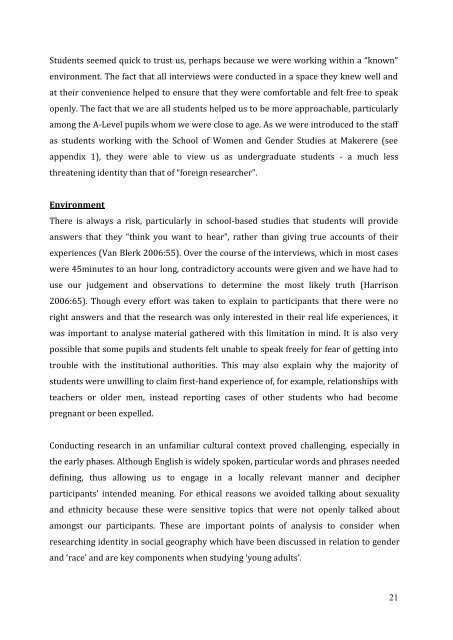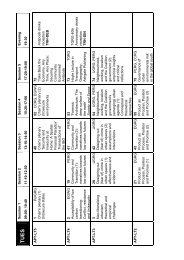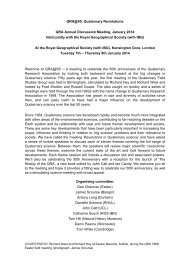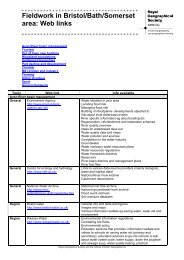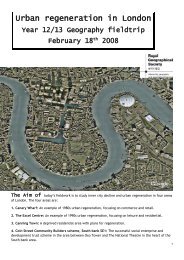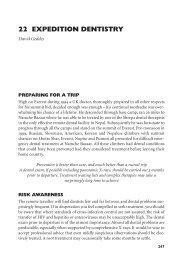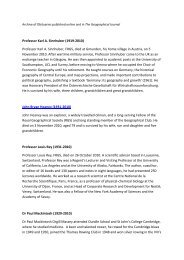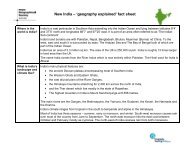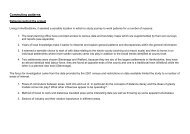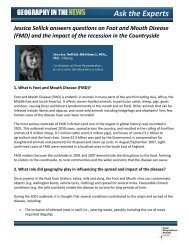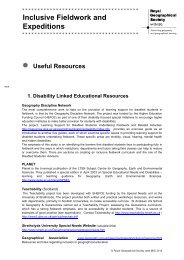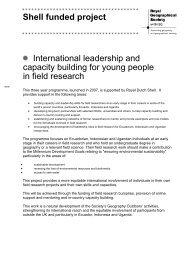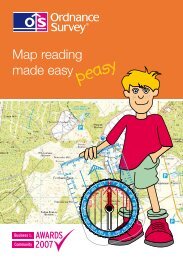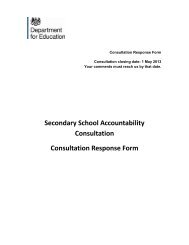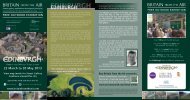Performing Identities in Urban Spaces; Kampala, Uganda - Royal ...
Performing Identities in Urban Spaces; Kampala, Uganda - Royal ...
Performing Identities in Urban Spaces; Kampala, Uganda - Royal ...
Create successful ePaper yourself
Turn your PDF publications into a flip-book with our unique Google optimized e-Paper software.
Students seemed quick to trust us, perhaps because we were work<strong>in</strong>g with<strong>in</strong> a “known”<br />
environment. The fact that all <strong>in</strong>terviews were conducted <strong>in</strong> a space they knew well and<br />
at their convenience helped to ensure that they were comfortable and felt free to speak<br />
openly. The fact that we are all students helped us to be more approachable, particularly<br />
among the A-Level pupils whom we were close to age. As we were <strong>in</strong>troduced to the staff<br />
as students work<strong>in</strong>g with the School of Women and Gender Studies at Makerere (see<br />
appendix 1), they were able to view us as undergraduate students - a much less<br />
threaten<strong>in</strong>g identity than that of “foreign researcher”.<br />
Environment<br />
There is always a risk, particularly <strong>in</strong> school-based studies that students will provide<br />
answers that they “th<strong>in</strong>k you want to hear”, rather than giv<strong>in</strong>g true accounts of their<br />
experiences (Van Blerk 2006:55). Over the course of the <strong>in</strong>terviews, which <strong>in</strong> most cases<br />
were 45m<strong>in</strong>utes to an hour long, contradictory accounts were given and we have had to<br />
use our judgement and observations to determ<strong>in</strong>e the most likely truth (Harrison<br />
2006:65). Though every effort was taken to expla<strong>in</strong> to participants that there were no<br />
right answers and that the research was only <strong>in</strong>terested <strong>in</strong> their real life experiences, it<br />
was important to analyse material gathered with this limitation <strong>in</strong> m<strong>in</strong>d. It is also very<br />
possible that some pupils and students felt unable to speak freely for fear of gett<strong>in</strong>g <strong>in</strong>to<br />
trouble with the <strong>in</strong>stitutional authorities. This may also expla<strong>in</strong> why the majority of<br />
students were unwill<strong>in</strong>g to claim first-hand experience of, for example, relationships with<br />
teachers or older men, <strong>in</strong>stead report<strong>in</strong>g cases of other students who had become<br />
pregnant or been expelled.<br />
Conduct<strong>in</strong>g research <strong>in</strong> an unfamiliar cultural context proved challeng<strong>in</strong>g, especially <strong>in</strong><br />
the early phases. Although English is widely spoken, particular words and phrases needed<br />
def<strong>in</strong><strong>in</strong>g, thus allow<strong>in</strong>g us to engage <strong>in</strong> a locally relevant manner and decipher<br />
participants’ <strong>in</strong>tended mean<strong>in</strong>g. For ethical reasons we avoided talk<strong>in</strong>g about sexuality<br />
and ethnicity because these were sensitive topics that were not openly talked about<br />
amongst our participants. These are important po<strong>in</strong>ts of analysis to consider when<br />
research<strong>in</strong>g identity <strong>in</strong> social geography which have been discussed <strong>in</strong> relation to gender<br />
and ‘race’ and are key components when study<strong>in</strong>g ‘young adults’.<br />
21


